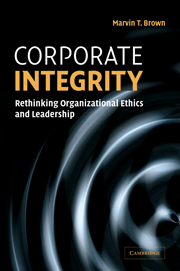Book contents
- Frontmatter
- Contents
- Preface
- 1 The context for corporate integrity
- 2 Cultural integrity as openness
- 3 Interpersonal integrity as relational wholeness
- 4 Organizational integrity as pursuing a worthwhile purpose
- 5 Social integrity as civic cooperation
- 6 Environmental integrity as natural prosperity
- 7 Corporate integrity and organizational leadership
- Appendix: Assessment worksheets
- Bibliography
- Index
6 - Environmental integrity as natural prosperity
Published online by Cambridge University Press: 05 September 2012
- Frontmatter
- Contents
- Preface
- 1 The context for corporate integrity
- 2 Cultural integrity as openness
- 3 Interpersonal integrity as relational wholeness
- 4 Organizational integrity as pursuing a worthwhile purpose
- 5 Social integrity as civic cooperation
- 6 Environmental integrity as natural prosperity
- 7 Corporate integrity and organizational leadership
- Appendix: Assessment worksheets
- Bibliography
- Index
Summary
The previous chapter concluded with the proposition that corporate integrity requires that corporations cooperate with other agencies in civil society in order to fulfill a city's mission. The chapter also showed how civil society serves as the context or container for such cooperative endeavors. This chapter addresses the final dimension of corporate integrity by exploring the container of both cities and corporations: the natural environment. How can corporations have integrity in their relationship with nature?
Understanding the relationship between corporations and nature may seem to rely completely on human imagination and knowledge. People may say that global warming is begging for attention, as though nature were speaking to us, but it is really the people who care about the future that are begging us to pay attention. There is a sense, however, in which we can hear nature by listening to our bodies. After all, we are creatures of nature. Our experiences of human vitality and fragility in different stages of life are nature's stories. So one way to understand an organization's view of nature is to review how it is designed to care for the health of its members.
Although any human community, by definition, is in part a natural community, some work communities have been designed so they are largely divorced from the rhythms of nature. The use of electric lighting, for example, creates a world of work separated from the earth's rhythm of light and darkness.
- Type
- Chapter
- Information
- Corporate IntegrityRethinking Organizational Ethics and Leadership, pp. 161 - 195Publisher: Cambridge University PressPrint publication year: 2005



